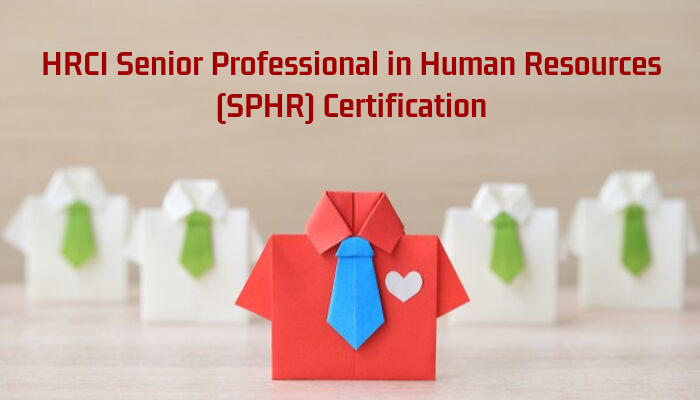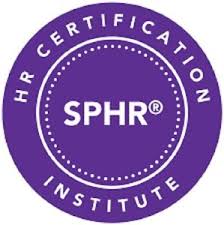Description of Senior Professional in Human Resources (SPHR) Certification
Senior Professional in Human Resources (SPHR) is an industry certification for people working in the human resource management profession, granted by the Human Resource Certification Institute. It is the senior-most human resources certification for those who have also shown a strategic mastery of the HR body of knowledge.
The SPHR reflects your mastery of the necessary and policy-making aspects of HR management. The SPHR credential is designed for big-picture HR thinkers responsible for planning rather than performing HR policy. Many organizations attempt out SPHR professionals for their proven accountability for HR department goals, breadth, and depth of knowledge in all HR disciplines, and understanding business issues behind the HR function.
SPHR Candidates
- Designs and methods rather than implements.
- Focuses on the big picture.
- Has a generalist role within the organization.
- Explains the business, not just the HR function.
- Has final responsibility in the HR department.
- Has six to eight years of consistent HR experience.
- Has breadth and depth of HR generalist knowledge.
- Uses judgment associated with time and application of knowledge.
- Knows the impact of decisions made within and outside of the organization.
- Maintains excellent negotiation skills.
- Manages relationships; attractions within the overall organization.
- Commands reliability within the organization, community, and field by experience.
- Certified individuals usually are issued a certificate attesting that they have met the standards of the credentialing organization and are entitled to make the public aware of their credentialed status, often through the use of initials SPHR after their names.
About SPHR Certification Exam
| Exam Name | Senior Professional in Human Resources |
| Exam Code | SPHR |
| Exam Fee | USD $495 |
| Application Fee | USD $100 |
| Exam Duration | 180 Minutes |
| Number of Questions | 175 |
| Passing Score | 500 / 700 |
| Format | Multiple Choice Questions |
HRCI HR Senior Professional Syllabus Topics:
- Leadership and Strategy (40%)
- Talent Planning and Acquisition (16%)
- Learning and Development (12%)
- Total Rewards (12%)
- Employee Relations and Engagement (20%)
Eligibility Requirements for SPHR Certification
To be eligible for the SPHR exam, you must satisfy one of the following requirements for education and experience:
- Have at least four years of experience in a professional-level HR position + a Master’s degree or higher.
- Have a minimum of five years of experience in a professional-level HR position + a Bachelor’s degree.
OR
- Have a minimum of seven years of experience in a professional-level HR position + a high school diploma.
Is the SPHR Certification Right for You?
Showcase the HR leadership recognition you earn with the Senior Professional in Human Resources (SPHR) from the HR Certification Institute (HRCI). The SPHR shows your mastery of the strategic and policy-making aspects of HR management as studied in the U.S. The credential is designed for big-picture thinkers responsible for planning rather than performing HR policy.
Organizations seek out SPHR professionals for their set responsibility for HR department goals, breadth, and depth of knowledge in all HR disciplines, and understanding business issues beyond the HR function.
SPHR Recertification
Your SPHR certification is legitimate for three years after testing. To keep your SPHR credential, you must earn 60 recertification credits over three years or retake the exam. Of the 60 recertification credits required, 15 must be Business Management and Strategy credits.
Key Competencies for Senior HR Professionals
Competencies can be described as permanent traits and qualities within individuals that result in inefficient performance. These can be related attributes such as knowledge, motives, skills, and abilities, or a mixture of these attributes, which help people to perform their jobs efficiently. You can think of competencies as a sequence of closely related qualities that make up the necessary knowledge, skills, and abilities, or KSAs.
There are some characteristics an HR professional should exhibit, to display competency in communication:
- Providing all the proper parties with regular, timely, consistent, and relevant information.
- Listening carefully to ensure the expected message was received and understood by all parties.
- Giving evidence by using an open and compact style of communication while enhancing communication by using the appropriate tone, as well as accurate grammar and punctuation.
- You are showing professionalism through the proper posture, body language, and level of eye-contact.
Behavioral vs. Technical Competencies:
Technical competencies can be described as the knowledge and skills needed to perform a specific role, whereas behavioral competencies are the attributes, motives, traits, beliefs, skills, and abilities that help people to achieve a particular position. Put, technical competencies make up the knowledge and abilities required to perform a specific role, while behavioral competencies reflect how the professional skills are applied effectively.
To put things in the context of the certified professional or senior certified professional exam, the Society for Human Resource Management (SHRM) believes that technical competencies reflect what knowledge HR professionals apply to their jobs, while behavioral skills reflect how they use this knowledge.
Examples of technical HR expertise comprise the domains of people, organization, workplace, and strategy knowledge domains. Behavioral expertise involves areas like ethical practice, leadership and navigation, business acumen, relationship management, communication, discussion, critical evaluation, and global and cultural effectiveness.

The Causal Relationship between Competency and Performance
There is a causal relationship between behavior, competency, and job completion. Competencies have many components: motives, traits, skills, and knowledge. Together these components can cause or predict practices or actions. These actions or behaviors can then more predict an outcome, such as job performance.
A competency is intangible and intensely seated within the individual, but it is manifested more tangibly through the individual’s behaviors and actions. When it is a business or professional competency related to the organization, these behaviors or actions equate to job performance.
Behavioral Competencies Across HR Activities
Behavioral skills are used across all areas of the organization and throughout several HR activities:
- Vertical Engagement: Behavioral competencies, such as communication and global and cultural effectiveness, are used in the vertical meeting. It happens throughout the organization, from senior management down to new hires.
- Horizontal Engagements: Relationship management and discussion are essential in the smooth meeting, which occurs with all of the various divisions and functions in the company.
- External Engagement: External engagement happens with external customers and stakeholders. When HR is associated with external engagement, competencies like ethical practice and business intelligence are essential.
- Group Engagement: Leadership and travel, as well as a critical evaluation, are essential competencies for group engagement, which includes the entire workforce as well as individuals.
Key Roles of Senior HR Professionals
As a business professional, you know and realize that there are several roles for SPHR professionals in every organization:
- Improving HR Strategies: Working with other members of the leadership team and the HR team to develop HR strategies.
- Leading HR Function: Taking responsibility for all of the changing parts and leading the HR team in its role.
- Fostering Influence in the Community: Being a visible and influential leader in the broader HR and business communities.
- Analyzing Performance Metrics: Having explicit knowledge of the competencies necessary to reach strategic goals and using that knowledge to analyze performance metrics.
- Overseeing the Execution of HR Operations: Taking full and final responsibility for the proper performance of all HR operations.
- Helping to Align HR Strategies to Organizational Goals: Working closely with compliments on the executive team to align HR strategies with organizational goals and objectives.
Behavioral Competencies for Senior HR Professionals
According to the Society for Human Resource Management (SHRM), there are behavioral competencies that you, as an HR professional, must demonstrate. Further, each skill has two degrees – the first degree includes behaviors seen in HR professionals at all levels of the organization. The second degree involves behaviors seen in HR professionals at higher levels, and these are the behaviors that should characterize HR leaders.
According to SHRM’s model, these behavioral competencies can be applied in various ways to individual people, the organization as a whole, the workplace, or when dealing with strategy.
HR Competencies Applied to Advanced HR Duties:
- Leadership and Navigation: This competency is required for senior HR professionals in the area of business and HR strategy.
- Ethical Practice: This competency is vital for senior HR professionals in the areas of employee relations in the organization, as well as diversity and inclusion in the workplace.
- Business Acumen: This competency is essential when it comes to talent acquisition and retention, learning and development, and total rewards. In the organization, business acumen also helps in the structuring of the HR function, as well as the management of technology and data. It is also included in risk management in the workplace.
- Relationship Management: This competency is essential when it happens to employee engagement, as well as learning and development. In terms of the organization and workplace, this competency is also necessary for dealing with factors such as employee relations, corporate social responsibility, diversity and composition, and risk management.
- Consultation: When it arrives at dealing with people, this competency is useful in skill acquisition and retention and employee engagement. In the organization, it compares to the structure of the HR function, and in the workplace, it refers to HR in the global context and corporate social responsibility.
- Critical Evaluation: This competency compares to talent acquisition and recognition, learning and development, and total rewards. In the organization, it corresponds to the structure of the HR function, employee relations, and technology and data. In the workplace, it refers to risk management, and it also correlates to business and HR strategy.
- Global and Cultural Effectiveness: In the workplace, this competency correlates to HR in the global connection, as well as difference and inclusion.
- Communication: This competency relates to employee commitment, technology, and data in the organization, as well as HR in the global context. It also refers to diversity and inclusion and risk management in the workplace.





